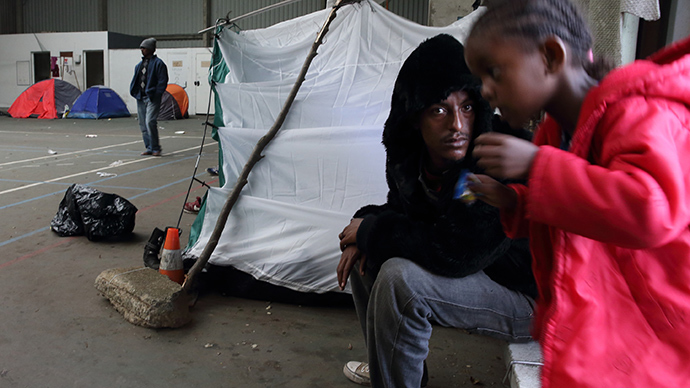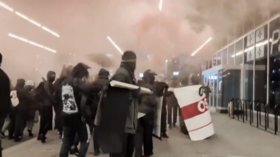UK detaining immigrant moms with kids 'obscene in modern civilized society'

The way immigrant detention centers in UK operate runs contrary to European values, often violates the law and is based on false fears, human right campaigners told RT.
The 13 facilities, called “Immigration Removal Centres,” hold in detention some 30,000 people. There the immigrants and asylum seekers, including torture survivors, mothers with children and other vulnerable individuals, can be kept under lock indefinitely in “appalling” conditions, Sarah Campbell, from the group Bail for Immigration Detainees, told RT.
“We are extremely concerned that there is no time limit on immigration detention in the UK. Some of the people we deal with have been in detention for several years, in some cases their mental health has deteriorated during that time. And it’s frankly appalling,” she said.
“We are seeing a lot of people being detained unnecessarily and in some cases unlawfully.”
The lack of access to proper healthcare is one of the biggest problems the detainees face, Campbell said.
“To give you an example we dealt with the case where a man who was diagnosed with prostate cancer didn’t receive any treatment while he was in immigration detention for a period of six months,” she said.
“He had four hospital appointments he was supposed to go to receive treatment. The Home Office failed to transport him to any of them and he only actually got treatment when he was released on bail as a result of an application by my organization. The Home Office opposed his release but the court decided to release him.”
The individual in question was among the many people who went on a hunger strike at one point to protest his situation. In addition to not being treated he was separated from his partner and children by the authorities.
The obstruction is facilitated by the procedure of medical evaluation of the detainees, explained Keith Best, former chief executive of Freedom from Torture, who also headed the Immigration Advisory Service charity.
“It’s very difficult because though doctors do visit and they are meant to check out people, it’s very difficult to get people actually taken out of the immigration detention on those medical grounds not least because the people actually looking at those reports are not really qualified to make that judgment,” he told RT.
Getting advice from a lawyer may be as difficult as getting one from a doctor for the detainees and it has just as serious an impact on their lives, Campbell said.
“Immigration law is extremely complex. Often the people we are dealing with might have a limited command of English, limited education, they don’t know the legislation they need to know to represent themselves effectively,” she said. “So without representation they can be detained and they can be also put on a plane and removed even while it’s not lawful.”
READ MORE: Hunger strike in UK immigration detention center spreads
The immigrants kept in those de facto prisons even though they didn’t commit any crimes have to endure harsh conditions, according to media and human rights groups’ reports. They face mistreatment from guards, including sexual harassment. Many develop mental health problems during their incarceration. Adding to that is uncertainty in their future, considering that they face deportation to their origin countries and whatever they fled from in the first place.
Being held in one of the centers is “a terribly traumatic experience,” Best said. Causing all this suffering is not only immoral but also unjustified, he believes, because the fear that they would disappear in Britain if released from custody is blown out of proportion.
“Quite frankly the degree of absconding by families with young children is so rare that there should be no courts whatsoever to put women and children into detention. That is obscene quite frankly in a modern civilized society,” he said.
“Most of those people want to have their claim properly looked at, properly adjudicated… There has been really no effort by the government to try to get the cooperation of people who are held in detention who very often want exactly the same thing as the government and that is to have a speedy determination or fair determination of their claim," Best said.
The statements, views and opinions expressed in this column are solely those of the author and do not necessarily represent those of RT.
The statements, views and opinions expressed in this column are solely those of the author and do not necessarily represent those of RT.











